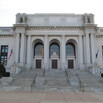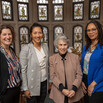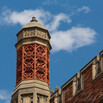Briefs by Faculty and Students Mentioned During SCOTUS Arguments
Two amicus briefs filed with the U.S. Supreme Court by Yale Law School faculty and students were mentioned by Supreme Court justices at oral arguments on December 1, 2020.
The cases of Nestle USA, Inc. v. Doe and Cargill, Inc. v. Doe raise questions on corporate liability under the Alien Tort Statute (ATS). The respondents are children from Mali who were trafficked and forced to work on cocoa plantations in the Ivory Coast.
Read more about the amicus briefs
Gerard C. and Bernice Latrobe Smith Professor of International Law Oona Hathaway ’97 filed one of the briefs mentioned on behalf of the Center for Global Legal Challenges at the Law School.
The brief details the long history of imposing liability on slave ships and argues that the legal violations alleged by the children on whose behalf the suit was filed — slavery, forced labor, and human trafficking — are among the most deeply established norms of international law. Several Law School students assisted Hathaway in preparing and drafting the brief during the fall.
The second brief was filed by the Peter Gruber Rule of Law Clinic (ROLC) under the direction of Sterling Professor of International Law Harold Hongju Koh and Visiting Lecturer Phil Spector ’00.
The Clinic’s brief points out the historically aberrant nature of the current administration’s claims. No prior administration has ever argued that U.S. corporations in particular should be categorically barred from civil liability for human rights violations under the ATS.
“Foreclosing U.S. corporate liability under the ATS would gut the statute in a way that contradicts the understanding of all recent administrations, the First Congress, and the many subsequent Congresses that have re-enacted the ATS,” the brief states.
The ROLC brief was filed on behalf of 16 former high-ranking U.S. government officials, including former Secretaries of State Madeleine Albright and John Kerry.
The distinction of both Yale Law School briefs being mentioned in court was highlighted in a story on Law.com.
“For a law professor, having a justice cite his or her law review article in a decision, or mention an amicus brief during arguments, is often a moment of professional pride,” wrote Law.com chief Washington correspondent Marcia Coyle in her coverage of the oral argument.
The Yale Law School Center for Global Legal Challenges is an independent Center that bridges the divide between the legal academy and legal practice on global legal issues.
The Yale Law School Peter Gruber Rule of Law Clinic addresses issues of national security, antidiscrimination, climate change, and democracy through litigation, policy advocacy, and strategic planning.


